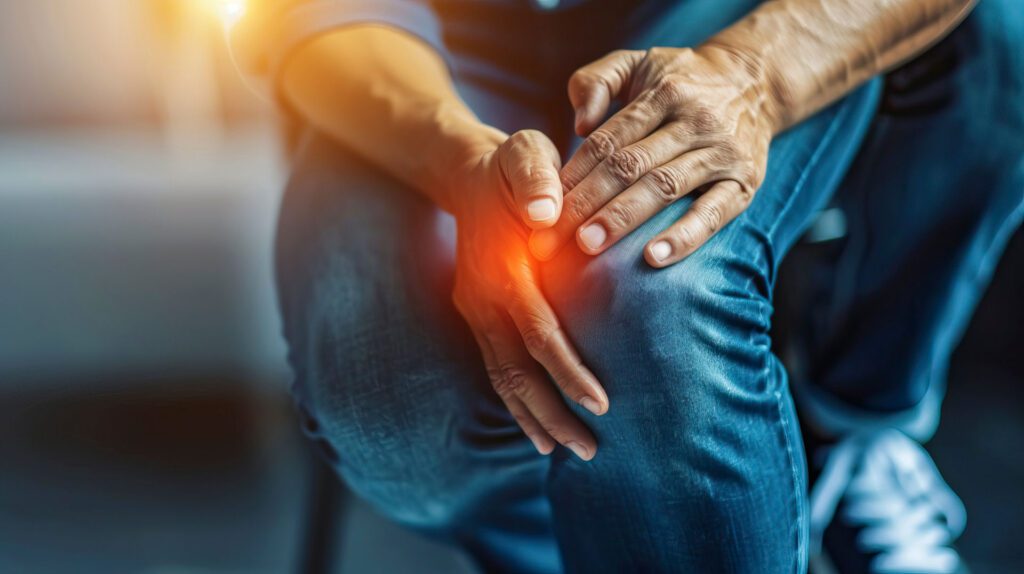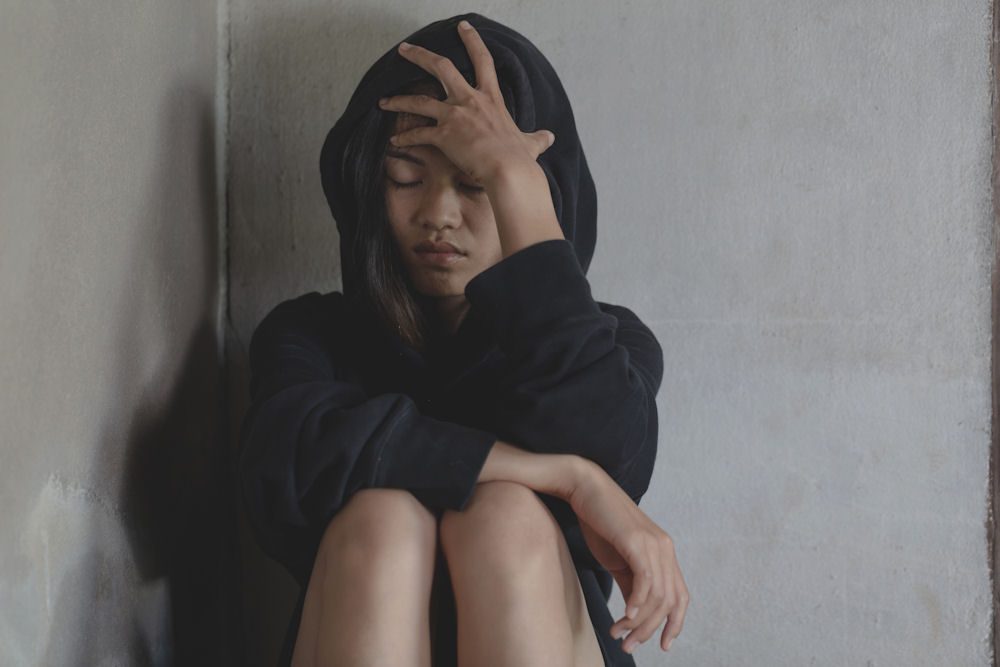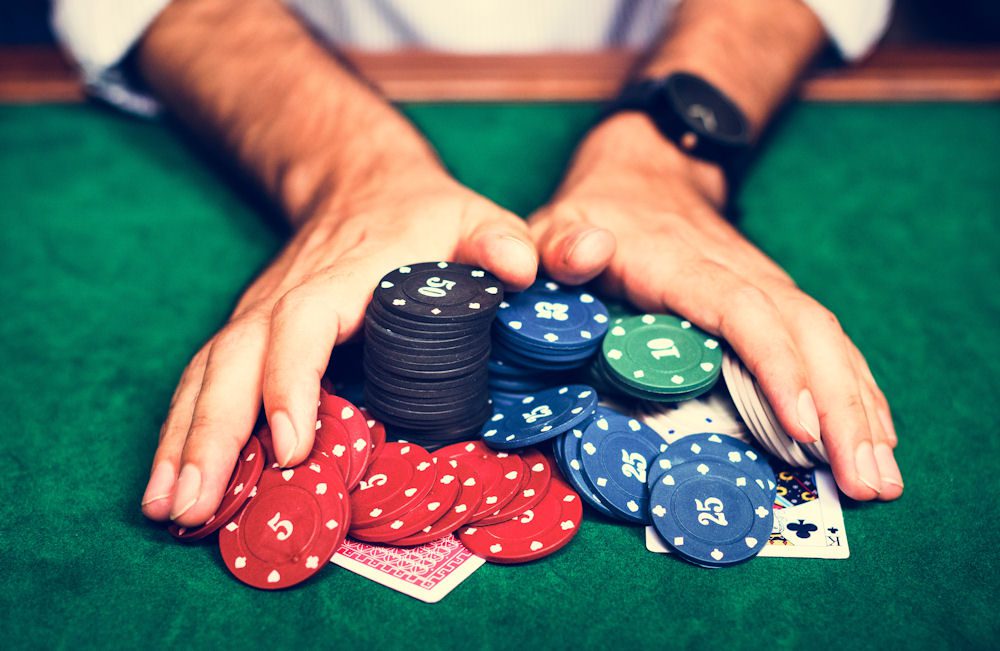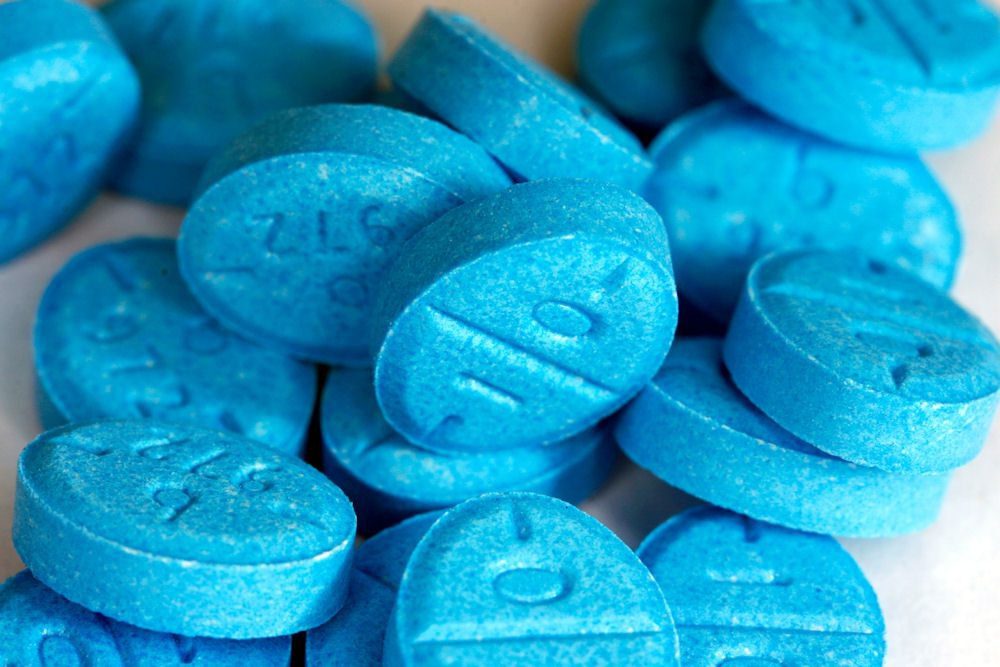How to Recognize Substance-Induced Psychosis
 When someone takes drugs, they may experience drug-induced psychosis (DIP). Drug-induced psychosis is a temporary mental disorder causing hallucinations or delusions, specifically triggered by substance abuse. Unlike other forms of psychosis, it directly results from drug misuse and requires prompt medical attention.
When someone takes drugs, they may experience drug-induced psychosis (DIP). Drug-induced psychosis is a temporary mental disorder causing hallucinations or delusions, specifically triggered by substance abuse. Unlike other forms of psychosis, it directly results from drug misuse and requires prompt medical attention.
Substances such as PCP, GHB, MDMA, LSD, alcohol, opioids, benzodiazepines, stimulants like cocaine and methamphetamine, and even caffeine and nicotine have been linked to psychosis, depending on individual sensitivity and dosage.
DIPs may occur with first time users who take too much of their drug of choice or any amount in between. Often times, people do not know that they’re experiencing a DIP. It occurs when drug use causes psychotic symptoms such as:
- Fear
- Anxiety
- Paranoia
- Depression and suicidal thoughts or actions
Most drugs of misuse are known for the feelings of euphoria, giddiness, laughter, etc. they cause in users. However, many times these feelings come with a price as these drugs can produce negative effects ranging from mild all the way up to devastating ones.
The drug that causes the psychotic effects varies widely depending on the drug. For example, GHB can cause GHB-induced psychosis, while methamphetamine can cause methamphetamine-induced psychoses.
Jump to Section
What are the Risk Factors for Drug-induced Psychosis?
The risk factors for drug-induced psychosis include drug abuse. Additionally, these drug induced psychosis symptoms are more likely to occur in people who have a pre-existing psychiatric disorder. Other risk factors for drug-induced psychosis include drug potency, drug purity, and the amount of drug used.
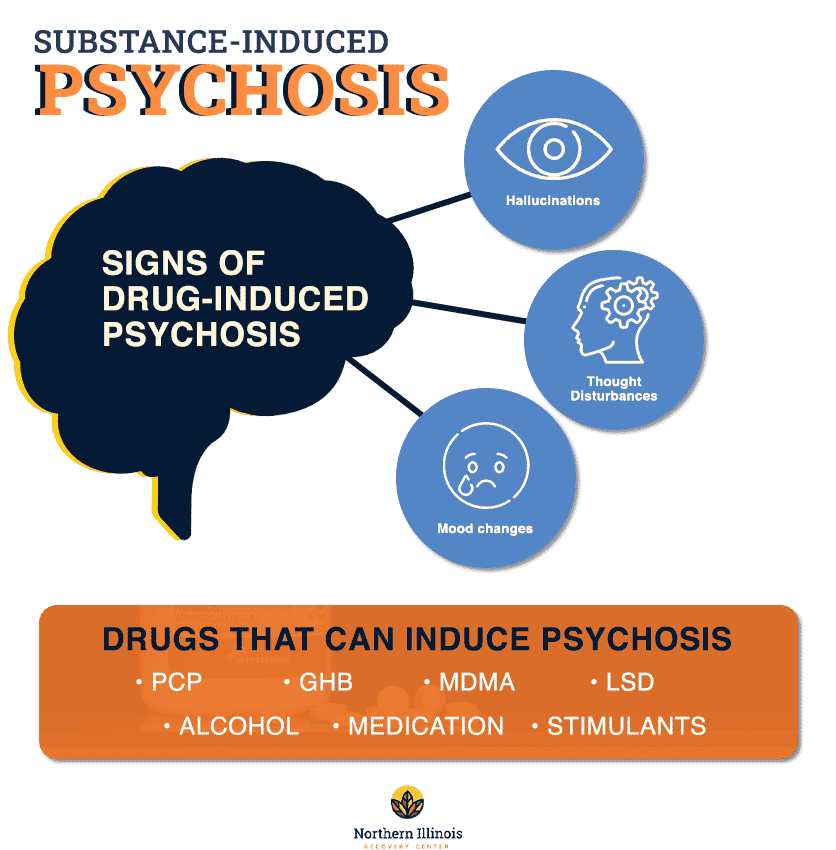
How to Recognize If Someone is Experiencing a Drug-induced Psychosis
Psychosis can be defined as a loss of contact with reality. Experiencing or witnessing a drug-induced psychosis will likely leave you wondering why the drug-induced psychosis occurred. More importantly, how can drug induced psychosis be treated? The only way to prevent drug-induced psychoses is through abstinence from drug use.
Symptoms of drug induced psychosis include:
- Sensory disturbances such as seeing something that isn’t there (hallucinations), hearing things (auditory hallucinations), or feeling sensations on the skin although nothing is there (parasthesias).
- Thought disturbances such as believing someone or something is trying to harm you, or having delusions of grandeur.
- Mood changes ranging from depression and anxiety to mania and anger with periods of normal mood in between.
- Urges to perform certain actions repeatedly like pacing back and forth, cleaning, swearing, shouting, crying, or laughing
These drug induced psychosis symptoms can be either temporary or long-term. Long-term drug induced psychosis is often referred to as chronic drug-induced psychosis. Chronic drug-induced psychosis results in a heightened vulnerability to developing schizophrenia later on in life.
Which Drugs Can Induce Psychosis and What Are Their Symptoms?
The drugs that can induce psychosis include, but are not limited to:
- PCP
- GHB
- MDMA/Mescaline
- LSD
- Alcohol and prescription medications like painkillers (opioids) and sedatives (benzodiazepines)
- Stimulants including cocaine, methamphetamine, ecstasy, caffeine, nicotine and marijuana
Hallucinogens are a diverse group of drugs that alter a person’s awareness of their surroundings as well as their own thoughts and feelings. Some hallucinogens are extracted from plants or mushrooms, and some are synthetic (human-made). Historically, people have used hallucinogens for religious or healing rituals.
In instances where individuals might use alcohol alongside these substances, the risk of developing a dependency increases. Alcohol addiction treatment programs provide comprehensive support and therapy designed to address the complex nature of substance abuse, including the co-use of hallucinogens and alcohol, helping individuals achieve long-term recovery and a healthier lifestyle.
Marijuana
The psychoactive effects of Delta 9-THC include psychotic symptoms, such as paranoia and hallucination, negative symptoms, feelings of disinhibition or dreaminess, sensations of heightened awareness of music, sounds, and colors or tastes.
Acute episodes of cannabis-induced psychosis can last from a few days to months, with a duration that varies consistently across studies. Synthetic cannabinoids (street names K2, Spice) are marketed as a cheap alternative to marijuana but are in fact dangerous or even life-threatening.
PCP
PCP is a drug that can cause drug-induced psychosis in two different ways. The first way PCP causes drug-induced psychosis is by the drug triggering an underlying mental illness. This illness could be schizophrenia or some other psychotic disorder. However, drug-induced psychosis caused through this route can be prevented if you never use PCP to begin with.
Another way drug-induced psychosis occurs with PCP is when people take massive doses of PCP in order to induce drug-induced psychosis on purpose for recreational purposes.The second way drug-induced psychoses occurs with PCP is when drug abusers mix cocaine and/or methamphetamine along with their PCP use. Mixing stimulant drugs like cocaine and methamphetamine with tranquilizers PCP together may lead to drug induced psychosis.
GHB
GHB (gamma hydroxybutyrate) is a synthetic drug made up of a chemical that is used as an industrial cleaner and also as a date rape drug. GHB can be found in many forms like pills or powder, but more commonly it is sold as a clear liquid with no smell or color. It was first popularized in the rave scene due to its euphoric feelings and body high it provides when administered at large quantities.
GHB’s use has increased over time because of its effects on sexual behavior including enhanced sensations of pleasure, disinhibition, increased arousal, and others associated with increased libido. The drug may also cause severe intoxication leading to abnormal behavior. If higher doses are taken then sobriety will fade away completely where memory loss occurs making it difficult for the user to remember.
MDMA
MDMA (3-4 methylenedioxymethamphetamine) is a drug often taken by drug users recreationally to provide a state of heightened sense and euphoria.The drug is known for making the user have feelings of love, happiness, empathy, etc. However this drug has been shown to come with several drawbacks as it is oftentimes associated with raves or parties where drug use is common.
Since MDMA can be found as a white powder sometimes those who abuse the drug will snort it through the nose. Side effects from using MDMA include drug addiction withdrawal symptoms such as depression, anxiety.
LSD
LSD is a drug that induces hallucinations, sensory perception changes, and can alter mood. LSD is a drug that has properties of both stimulants and hallucinogens. The drug is known for making the user have feelings of love, happiness, empathy, etc. However this drug has been shown to come with several drawbacks as it is oftentimes associated with raves or parties where drug use is common.
Methamphetamines
Methamphetamines have a bad reputation around the world, no matter what country you are in. Methamphetamine is a potent psychostimulant that can induce psychosis among recreational and chronic users, with some users developing a persistent psychotic syndrome that shows similarities to schizophrenia.
There is no single drug that induces drug induced psychosis. Drug induced psychoses can be prevented by understanding the drug’s side effects and addiction potential before taking it. The only valid way to prevent drug induced psychoses is through abstinence from drug use.
The Relation Between Drug Induced Psychosis to Mental Health
Psychosis can present damaging effects to a person’s mental health. Hallucinations, delusions, and disorganized thinking all can have a negative effect on an individual’s life if they are not treated. This is why drug induced psychosis is so dangerous as drug use is often at the root of drug induced psychoses.
Individuals with bipolar disorder or psychotic depression can experiecne psychotic episodes. Consequently, individuals with brain tumors, cysts, or untreated HIV or syphilis can experience psychosis. When an person has a mental illness that already has the potential to include psychosis, substance abuse can more easily lead to this symptom.
How Does Drug-Induced Psychosis Impact the Brain?
Psychosis from drugs impact the brain by drug use alters the drug receptors, neurotransmitters, and neuroanatomy. For example, drug induced psychosis can happen after brain structures are damaged by drug abuse or if there is drug induced toxicity that affects brain chemistry. The drug-induced form of psychosis has a psychological effect on an individual’s fear to be in public or fear of social gatherings as they may experience delusions and hallucinations.
How Long Can Pyschosis From Drugs Last?
Drug-induced psychosis typically lasts between two to five days, depending on the drug and individual factors. Meth-related cases can extend for years, but most are temporary, contrasting with longer-lasting psychotic disorders like schizophrenia.
Drug induced psychosis doesn’t necessarily have an ending point because someone may not immediately realize that their drug-intake caused a drug-induced psychosis. On average, drug induced psychoses are shorter than psychotic disorders, which are often related to schizophrenia.
Symptoms of acute drug induced psychoses may last for days or weeks while symptoms of chronic drug induced psychoses could linger for months or years after the individual has stopped taking drugs. Unfortunately, there is no standard drug induced psychosis duration.
Can Psychosis from Drugs Become Permanent?
Drugs that induce psychosis are usually short term. Short term drug induced psychosis symptoms are usually followed by drug withdrawal symptoms that resemble schizophrenic delusions and hallucinations. Some drug induced psychotic disorders resolve without treatment but other cases need medications to help relieve the delusions and hallucinations.
Psychosis from drugs can become permanent. If drug induced psychosis is not treated, the person could experience a drug-induced form of schizophrenia, which will be a lifelong diagnosis.
What are the Types of Treatments Available for People with this Issue?


Long term drug abuse often leads to disruptions in these neurotransmitters which leads to drug induced psychosis episodes when attempting to stop drug use cold turkey or if stopping slowly after long-term repetitive use.
In cases where drug induced psychosis episodes are triggered by drug cessation, an inpatient drug rehab program is often needed to stabilize the person. However, drug-induced psychosis can also be treated with medications such as antipsychotics.
If you believe that you are experiencing drug-induced psychosis symptoms, it is important to seek help right away. The first step to treating drug-induced psychosis is to get into an emergency room immediately. Once at the hospital, doctors may treat your symptoms by administering drugs such as benzodiazepines or antipsychotics. It is important to note that these drug induced psychosis treatments are only meant to treat the symptoms of drug-induced psychosis.
Drugs commonly used for treating drug-induced psychoses include haloperidol (Haldol) and lorazepam (Ativan). These drugs will not completely eliminate the symptoms but they do help reduce the intensity of them. As for preventing drug induced psychoses, you should understand the effects of the substances you’ve taken.
Detoxification
Detoxification can rid the drug-induced psychosis effects of drug abuse. When detoxification is the only thing done to rid drug-induced psychosis, it often leads to drug relapse. For drug induced psychosis episodes that are triggered by drug cessation, a drug rehab program will sometimes be used in conjunction with medication given to treat the psychotic condition. Psychiatric medications are effective at treating drug-induced psychosis when drug rehabilitation programs alone are not enough.
Partial Hospitalization Programs
Partial Hospitalization Programs or Day Rehabilitation Programs are designed to help drug abusers only. These drug rehab treatment centers in illinois provide drug rehab programs while also providing drug counseling services to recovering individuals. These structured sessions include counseling, group support, and a space for medical professionals to examine patients. Thus, the person will receive the necessary drug education while also getting drug detoxification treatment.
Dual Diagnosis Treatment
Dual diagnosis treatment centers are drug rehab programs that address drug addiction in people who also suffer from mental health issues such as drug-induced psychosis. Dual diagnosis treatment centers often focus on treating both drug addiction and the drug-induced psychosis episode simultaneously, there treatments may include pyschotherapy and certain medications. Considering substances are used to self-medicate, a overwhelming portion of recovering individuals have a co-occurring disorder. It is vital to treat both in order to ensure the best outcomes, avoiding chronic relapse.
Psychotherapy
Individual therapy is used to help those with drug induced psychosis to learn how to deal with drug-related hallucinations and/or delusions. Group therapy is sometimes used for this purpose as well and can be a venue for peer support and help groups. Family therapy is an option if family members or loved ones were affected by drug use, or if they felt impacted by the person’s drug use problems.
Seek Support at Northern Illinois Recovery
Psychosis from drugs can be terrifying to witness and experience. Distancing yourself from reality can be temporary but sometimes individuals aren’t as lucky. A new, healthy lifestyle is just on the horizon. Don’t fall into the trap of stigmas from receiving treatment for substance abuse and/or mental health disorders. Northern Illinois Recovery dedicates the time, energy, and staff towards helping you reach your goals. The road to recovery can be littered with challenges and doubts but we’re here for you. If you or someone you know is struggling with substance abuse, contact one of our facilities today.


Licensed Physician and Surgeon
Dr. Beth Dunlap, a board-certified addiction medicine and family medicine physician, and is the medical director at Northern Illinois Recovery Center. She is responsible for overseeing all the integrated medical services at both campuses. Beth completed medical school, residency, and fellowship at Northwestern University, where she continues to serve on the faculty as a member of the Department of Family and Community Medicine. She has extensive experience in addiction medicine at all levels of care, and her clinical interests include integrated primary care and addiction medicine, harm reduction, and medication-assisted treatment.


